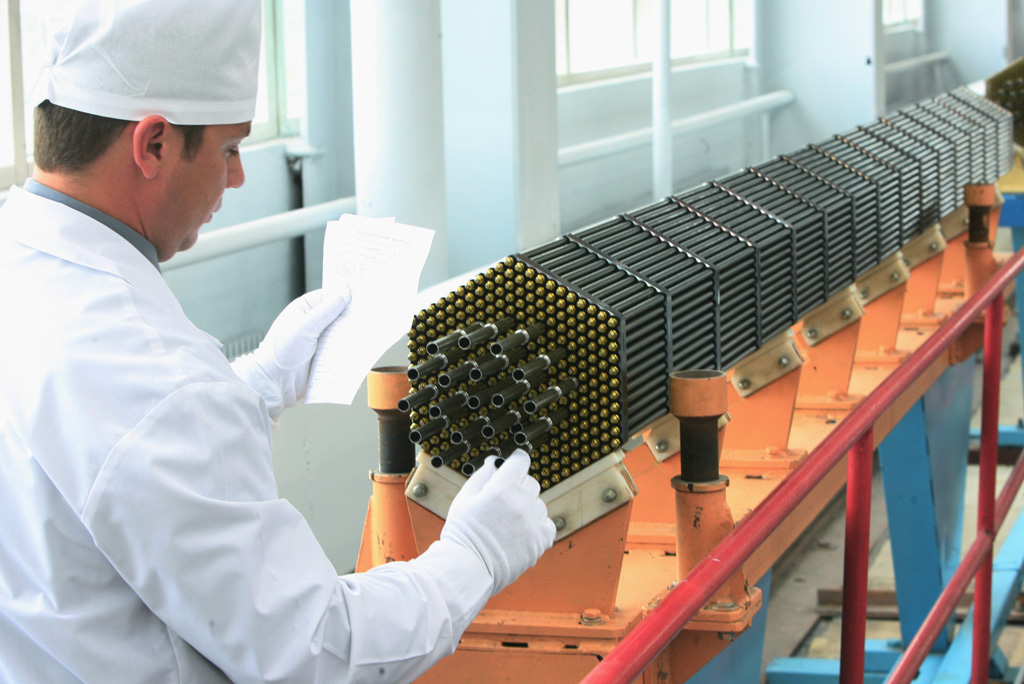
A fuel assembly for a nuclear reactor.
Good question and one I get all the time. The other links I’ve found on the internets do a good, but dry, job describing what career paths are available to nuclear engineers. I get this question a lot from prospective students, so I thought I would jot down the answer here.
Before we begin it is important to remember that with many, if not all, degrees, the discipline helps define the career but does not cast the graduate into an ineluctable career path. How many English majors do you know that write books for a living.
Also, it is important to keep in mind that the typical career is dependent on what degree level we are talking about. In most cases, when someone asks this question they want to know about a nuclear engineer with a bachelor’s degree, so that is where we will start after the jump.
With a bachelor’s degree in nuclear engineering a person can work in the nuclear power industry. The first image that comes to mind here is working at a nuclear power plant, and indeed that is an option. In this job one will be responsible for solving problems and performing calculations in the operation, refueling, and safety of the plant. This is not Homer Simpson’s job. This is a job that often requires a jack-of-all trades, e.g. someone that is good a solving different kinds of problems that arise at the plant. One drawback to this career path is that nuclear power plants typically are not in the most populated areas; so if that is your preference in lifestyle this might not be your choice. For a map of operating plants click here.
Besides working at a plant, there are careers on the vendor side of the nuclear power industry. The companies that manufacture the fuel for power plants, design the reactors, and provide additional engineering support to the utilities that operate the plants. Also, the field of nuclear waste management is a important topic that nuclear engineers work on.
Also with a bachelor’s degree there are jobs in the government sector. The regulatory agency in the US, the Nuclear Regulatory Commission (NRC), oversees the nuclear industry to make sure that the best practices in safety and security are adhered to at operating nuclear facilities (not just plants) as well as certify the design of plants that to be built in the future. The NRC hires at all degree levels.
Other government opportunities include the intelligence agencies (e.g. CIA) and Department of State. In both of these instances these engineers will perform analyses on international capabilities, including clandestine activities in the intelligence case, or evaluate policy regarding nuclear matters and nuclear nonproliferation. Outside of these, the Department of Energy, which oversees the national energy laboratories (more on them below), also hires entry-level engineers.
There are also jobs in the application of radiation to industry outside of the power industry. The oil industry, through the process known as well logging, use radioactive sources to monitor where hydrocarbons are in the ground. Also the areas of non-destructive testing (in use in many industries), radiation therapy in cancer treatment, and food safety (through food irradiation).
For those with higher degrees (Masters and PhD.) a good career option are the Department of Energy Laboratories (map). These labs support all the research and development of nuclear technology (from power production, radiation use and safety, and defense applications) of the nation. Different labs hire a different mix of degree levels: for instance Los Alamos National Lab (where I used to work) hires a large majority of PhD. level engineers whereas other labs (e.g., Idaho National Lab, I think) hires more bachelor’s and masters degree holders. Of course all of this depends on the particular sub-field in nuclear engineering (reactor design leaning towards the bachelor’s and masters, whereas computation/simulation of nuclear systems more heavily staffed by PhD.-level workers).
For more information, check out the American Nuclear Society the professional society for nuclear engineers, and various webpages from nuclear engineering departments (e.g., Texas A&M) or the webpages from the government agencies mentioned above.
As always, feel free to post in the comments and questions, suggestions, and corrections in the comments section.